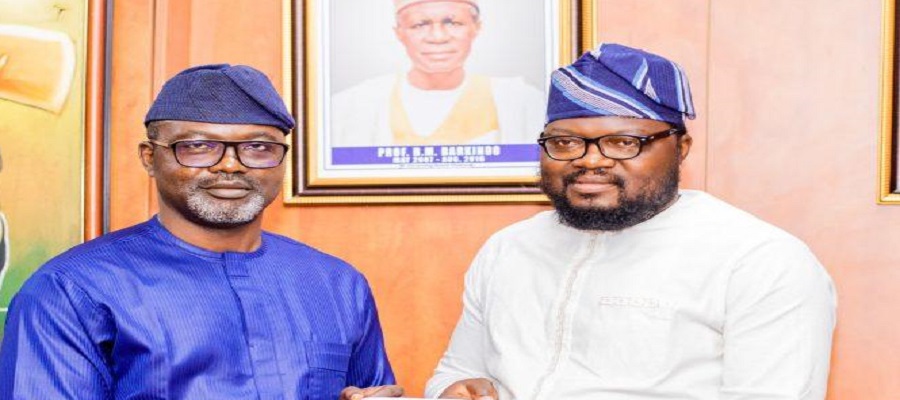News
FAAN, NCC Partner to Combat Copyright Piracy

Federal Airports Authority of Nigeria (FAAN) and Nigerian Copyright Commission (NCC) have committed to the development and implementation of a national anti-piracy strategy to address the sale of pirated books, films, music and other copyright infringing materials in and around the nation’s local and international airports.
Both Federal agencies agreed to work out the modalities for sustained proactive enforcement to ensure that the interest of right owners are adequately protected in line with the Federal Government policy of guaranteeing adequate return on investment and growing the creative sector.
Captain Rabiu Yadudu, managing director, FAAN, and Mr. John O. Asein, director-general, NCC, disclosed this recently, during a consultative meeting held at FAAN Headquarters, in Ikeja, Lagos.
Captain Yadudu gave firm assurance that FAAN would partner with NCC to ensure that its premises do not become a safe haven for copyright criminals.
He reiterated the commitment of FAAN to support NCC in its renewed fight against piracy in Nigeria.
According to him, “We are committed as Government agencies to protect public interest even in copyright matters and we owe a duty to assist each other in executing our mandates.
“The legal and commercial teams of FAAN will be deployed to assist NCC to strengthen its enforcement actions at airports across the country”.
While decrying the pervasive piracy in all copyright sectors, the FAAN MD urged right owners and other stakeholders in the industry to address the challenges in the distribution networks so as to make genuine copyright works more readily available in the market.
Earlier, Mr. Asein had expressed concern at the high volume of pirated materials at the nation’s airport and the negative impact of this, not only on the fortunes of right owners but also on the nation’s image.
He stressed that the criminal activities of a small percentage of Nigerians were capable of distorting the country’s image as a land of talented, industrious and law-abiding people.
Mr. Asein noted with regret that the activities of pirates have adversely affected the educational sector and threatened the book industry.
According to the Director General, some of the authors whose books were highly pirated included those of Nobel laureate, Prof. Wole Soyinka; former Presidents like Chief Olusegun Obasanjo and Dr. Goodluck Jonathan as well as renowned authors like Olusegun Adeniyi.
Explaining the commitment of NCC to ridding Nigeria of reckless distribution of pirated materials, he remarked that his agency in collaboration with relevant sister agencies, would intensify efforts at different production, distribution and sales points; at border posts; air and sea ports; hotels, malls and other public places; and on the streets, as part of a comprehensive action plan against all forms of piracy and copyright abuses.
He added, “The Commission needs FAAN as well as other regulatory and enforcement agencies as key partners in its renewed drive to curb wanton copyright infringement in Nigeria.
“We are committed to full implementation of our mandate for sustainable growth of the creative industry. With your support, copyright piracy will not thrive under our watch”.
Commenting on the development, Mr. Lawrence Aladesuyi, Chairman of the Anti-Piracy Committee of Nigerian Publishers Association (NPA), described the inter-agency initiative as a proactive effort which would stem the tide of piracy in Nigeria and change the negative image that pirates were creating for the country.
Observing that piracy kills creativity and the creative industry as well as denies Government of legitimate revenue since pirates evade tax payment, Mr. Aladesuyi urged FAAN to explore its partnership with NCC to stamp out piracy outlets in all their platforms.
He assured of the support of NPA for what he described as “a long awaited, laudable initiative”.
A copyright stakeholder, Mr. Olusegun Adeniyi, while commending the initiative, denounced the pervasive onslaught of copyright piracy, not only at the airports, but in all places in the country: shopping malls, bookshops, hotels and on the streets.
“I am in constant dialogue with the DG of NCC and willing to assist the ongoing efforts to check piracy in the interest of the creative industry”, he added.
Mr. Bankole Olayebi, managing director, Bookcraft Limited, Ibadan, remarked that piracy was damaging the interests of authors, publishers and the ownership of intellectual property (IP) in Nigeria, thereby undermining the development of the country on a sustainable basis.
He added, “Bookcraft, on behalf of other stakeholders, appreciates the efforts of NCC towards the protection of right owners and the copyright based industries.
“We support the inter-agency collaboration for enhanced copyright protection in the country”, he stated.
News
LG Launches “Radio Optimism” Campaign to Spread “Life’s Good” Through Music

LG Electronics has launched a new brand campaign, “Radio Optimism,” designed to help strengthen meaningful human connections and spread optimism through shared musical experiences.

This initiative aligns with LG’s brand promise, “Life’s Good,” and addresses the growing challenge of forming genuine relationships in a technology-driven world.
The Radio Optimism campaign seeks to counteract the disconnection often felt in an era dominated by superficial interactions, such as likes and comments on social media. By harnessing the power of music, LG aims to foster deeper bonds among individuals, promoting a more fulfilling life.
“As technology advances, meaningful human connections become increasingly vital to enrich our lives. LG continues its commitment to bringing optimism into customers’ daily lives, staying true to our enduring brand promise of ‘Life’s Good,’” said Kim Hyo-eun, head of LG’s Brand Management Division.
This campaign reinforces LG’s commitment to creating enriching experiences in digital spaces where today’s consumers spend significant time. Building on this mission, LG has continuously engaged with younger audiences through participatory campaigns that bring the Life’s Good philosophy to life.
Last year’s “Optimism your feed” campaign leveraged social algorithms to foster positivity on social media. This new initiative specifically seeks to address the paradoxical disconnection in an era of hyper-connectivity.
“One of the most reliable predictors of happiness is having deep and meaningful relationships,” said Jean M. Twenge, Professor of Psychology at San Diego State University. “Yet today, many people are spending more time online and less time connecting in person. Social media in particular tends to create shallow relationships rather than the deep connections people need.
“It’s common for people to have hundreds of followers but no one to talk to in real life if they need support. We need to build more meaningful connections with those around us. That might turn around the pronounced decline in happiness that’s occurred over the last decade.”
A new global study* from LG on social connection reveals that 68 percent of people find it harder to make real friends, and a third reported having one or fewer meaningful connections in the past month, with 8 percent experiencing none at all.
Inspired by traditional radio’s unique way of connecting people through music and storytelling, the Radio Optimism campaign transforms this concept into an interactive platform where participants can create and send personalized songs to their loved ones.
Users can easily create new songs using AI-powered tools, which are thoroughly trained on a curated music dataset. These tools interpret user prompts to produce unique musical pieces and generate matching album art, providing an engaging and personalized experience. Once generated, these songs can be sent to recipients to deepen their connection and made available for others to discover worldwide.
According to the survey, nearly 9 in 10 respondents believe that meaningful connections lead to a more optimistic outlook on life. By providing a platform for individuals to express their feelings, this campaign aims to foster deeper connections and help individuals enrich their lives while spreading optimism in their own ways.
The campaign website is available in English and Spanish, with plans to support additional languages in the coming months to enable broader participation. The official website can be found at RadioOptimism.lg.com.
News
Nigeria’s Electricity Output Climbs 10.92% in Q1 2025, Boosted by Thermal Plants

Nigeria’s electricity generation rose by 10.92% in the first quarter of 2025, driven by improved operational capacity and better availability of thermal and hydropower plants supplying the national grid.

This is according to the latest report from the Nigerian Electricity Regulatory Commission (NERC) for Q1 2025.
Total energy generated stood at 10,304.47 gigawatt-hours (GWh), up from 9,289.95 GWh recorded in the previous quarter. The increase highlights stronger performance across multiple power plants, supported by improved grid dispatch conditions.
NERC noted that average hourly generation on the grid also grew by 13.39%, rising to 4,770.59 megawatt-hours per hour (MWh/h) from 4,207.41 MWh/h in Q4 2024—an increase of 563.18 MWh/h.
“The hourly generation and the total generation increased by 13.39% and 10.92% respectively in Q1 2025 compared to Q4 2024. This rise is linked to an increase in the cumulative available generation capacity of grid-connected plants,” the report stated.
A total of 19 power plants boosted their output during the quarter, contributing significantly to the overall rise in generation.
Thermal power plants were the main drivers of growth. Out of the 23 thermal plants connected to the grid, 16 recorded higher average hourly output compared to the previous quarter.
Top contributors included Delta_1, which added 157.58 MWh/h, followed by Geregu_2 (71.95 MWh/h), Egbin_1 (68.20 MWh/h), and Afam_2 (68.03 MWh/h).
Hydropower plants also supported the growth, though at a smaller scale. The five grid-connected hydro stations posted a combined increase of 54.93 MWh/h, marking a 4% improvement. Zungeru_1 led with a 23.55% rise, while Shiroro_1 and Kainji_1 grew by 12.21% and 4.80% respectively.
This first-quarter improvement reflects ongoing efforts to stabilize power supply through better plant maintenance, enhanced grid management, and more consistent dispatch across regions.
However, challenges such as fuel supply to plants, equipment reliability, and high operating costs continue to limit the full potential of Nigeria’s power generation capacity.
News
DBI, Miva Open University Partner to Advance Digital Innovation, Education

Digital Bridge Institute (DBI) and Miva Open University, Abuja, have signed a Memorandum of Understanding (MoU) to jointly promote digital technology and academic excellence in computer science and innovation.

Mr. David Daser, president/CEO, DBI, and Professor Tayo Arulogun, vice chancellor, Miva Open University.
DBI, a Federal Government-owned ICT training institute with headquarters in Abuja and campuses across Nigeria’s six geo-political zones, hosted the signing ceremony at its headquarters.
The MoU marks a significant step in formalizing and strengthening the existing relationship between the two institutions.
Signing on behalf of their institutions were
Speaking during the event, Mr. Daser praised Professor Arulogun’s leadership and commitment to academic development, which he said made the partnership possible. He emphasized that unlike many MoUs that remain inactive, this collaboration is set to deliver tangible results.
“We value this partnership and are confident it will meaningfully contribute to Nigeria’s education sector. DBI is fully prepared to implement the agreement and drive an impact across our campuses in Enugu, Abuja, Kano, Lagos, Asaba, and Yola,” Daser said.
He added that the collaboration would strengthen DBI’s National Innovation Diploma (NID) program and other initiatives through shared resources and new opportunities.
Professor Arulogun, in his remarks, highlighted the need for greater collaboration among Nigerian universities, criticizing the prevalent “do-it-alone syndrome.”
“Many institutions prefer to operate in silos, but collaboration is key. Pooling resources and working together will enhance capacity and academic output,” he stated. “With this partnership, we are ready to hit the ground running from student exchange to joint innovation projects like hackathons.”
He noted that hackathons provide platforms for discovering hidden talents and fostering innovation, and Miva is eager to integrate such activities into its academic programs.
Mr. Emeka Nzeih, head of Learning and Development, DBI, outlined the partnership’s key focus areas: student internships, real-world project collaborations, joint research in fields like AI, robotics, and cybersecurity, and shared access to DBI’s ICT labs and equipment for Miva’s students and faculty.
According to Nzeih, the initiative aims to enhance practical learning, foster innovation, and build capacity through collaborative training, research, and mentorship.

 Telecom2 days ago
Telecom2 days agoMTN Nigeria Debuts Game-Changing CPaaS Platform at NextNow Forum

 News2 days ago
News2 days agoAMCON Confirms ₦100Bn Sale of Ibadan DisCo Amid Legal Disputes

 E-Financial2 days ago
E-Financial2 days agoNAICOM Issues New Licenses to SanlamAllianz Life, General Insurance

 E-Financial1 day ago
E-Financial1 day agoCourt Affirms NIBSS Authority to Manage BVN

 E-Business2 days ago
E-Business2 days agoDomain of Deception as Attackers Deploy Spyware Under Guise of Legal Threats

 E-Financial2 days ago
E-Financial2 days agoGTCO to Become First Nigerian Bank to List on London Stock Exchange

 Telecom1 day ago
Telecom1 day agoMTN, 9mobile Commence Ground-breaking National Infrastructure Partnership

 Broadcasting2 days ago
Broadcasting2 days agoIFC, AfDB Collaborate with EbonyLife Media to Explore Supporting the African Film Industry to Drive Job Creation


























